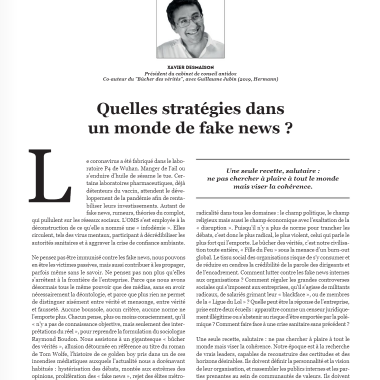Since the #MeToo movement, the Internet has proved to be the best place to get the crowd onside. But it’s a weapon that needs to be handled with care, because it can backfire. This is what the Geox case illustrates.

Volume de vidéos mentionnant Geox sur TikTok entre le 7 et le 14 avril (source : Visibrain)
In one day, the Italian shoe company Geox found itself at the centre of a scandal unprecedented in its history, at the root of which was a video taken by a temp in the firm’s Strasbourg shop: the young woman, who describes herself on TikTok as an ‘inspiring Muslim’, ‘new veiled’ and who ‘embraces the hijab’, secretly films her dismissal by the shop manager, motivated by the veil she was wearing that day, the first of her temp assignment. Published on TikTok on Wednesday 10 April, then widely relayed on X (formerly Twitter) from Thursday 11 April, the scene, which had the appearance of a diplomatic incident, provoked very vehement reactions on social networks and rekindled the issue of discrimination in recruitment and religion in private companies.
Polemical outburst on social networks and in the media…
On TikTok and X, the filmed exchanges between the young Muslim woman and the shop manager provoked a clash of contradictory opinions.
Siding with the temporary student, the Collective Against Islamophobia in Europe (CCIE) reacted strongly on X, denouncing ‘unacceptable discrimination’ and calling on internet users to contact the Geox company to express their disapproval.
[1/3]🚨 Mobilisons-nous pour interpeller GEOX et condamner cette discrimination inacceptable ! Il est nécessaire que GEOX éclaircisse sa positon face à ce scandale. Est-ce que l’entreprise accepte d’être représentée par des personnes qui discriminent ouvertement ?#islamophobie https://t.co/TXrq9ZtaBR
— CCIE (@CCIEurope) April 11, 2024
Also on X, a number of users encouraged people to post fake reviews on the shop’s Google page (“Don’t hesitate to go to Google, Geox, Strasbourg, and leave a really bad review. That’ll get those racists off their backs”, ’Google Geox Strasbourg… Leave them some really disgusting reviews. Boycott”, “Geox ça va aller mettre des sales avis”, ’Tenez les gars mettez le maximum d’avis négatif!) The shop then became the scene of a malicious digital raid, as evidenced by the avalanche of negative reviews posted on its Google page (110 reviews in one evening, bringing the rating down to 2.7/5, compared with 62 reviews published since 2017 for an average rating of 4.1/5). Google reviews, a kind of digital verdict that establishes a company’s reputation, influence the performance of a commercial activity, as they have consequences for purchasing decisions: false or defamatory reviews could therefore seriously damage a retailer’s economic health. Google, however, took it upon itself to remove these reviews, which clearly did not reflect the customer experience. Proof that measures exist to quickly remove inappropriate judgements and thwart the onslaught of digital people’s courts.

Volume de tweets mentionnant Geox entre le 7 et le 14 avril (source : Visibrain)
On the other hand, in response to the torrents of insults and death threats hurled at the shopkeeper, Jean Messiha (a former member of the RN and then Reconquête) has launched a kitty on the GoFundMe crowdfunding platform to support the shopkeeper ‘who will probably have to face costly legal proceedings’. The €60,000 or so already raised illustrates an enthusiasm contrary to support for the temp.
In addition, journalists such as Juliette Briens (L’Incorrect) and influencers such as Bassem, a Franco-Tunisian rapper from the Lyon suburbs, have criticised the young woman’s gesture, accusing her of deliberately filming the scene out of provocation, unable to ignore the potentially tragic consequences for the manager in a post-Samuel Paty France. In the media, the controversy raised the question of the legality of the attitude of the two protagonists, and rekindled a debate on employment discrimination in France.
Faced with this controversy, Geox management responded on Friday 12 April with a press release in which it recalled ‘first of all that its internal regulations strictly respect the terms of French legislation (in particular Article L 1321-2-1 of the Labour Code), which authorises employers with regard to religious freedom to insert a neutrality clause or a memo falling under the same rules (Articles L 1321-2-1 and L 1321-5 of the Labour Code)’. It was also keen to ‘express its full support for the teams and customers threatened since [the outbreak of the controversy]’, and hopes that ‘calm will return as quickly as possible’.
… with unexpected consequences for the video’s author
The young woman admits to glossing over the fact that she wears the veil on her CV and LinkedIn profile, for fear of not being recruited. However, the singularity of the Geox case lies not in discrimination in recruitment (the temporary worker who was turned away had de facto already been recruited), but in a failure to comply with internal regulations, coupled with a desire to harm someone. The issue of video recording, undoubtedly without the vendor’s knowledge, is also problematic. Article 226-1 of the French Criminal Code has been invoked to condemn this violation of privacy, but Raymond Taube, founding director of the IDP (Institut de Droit Pratique) doubts that this article is applicable in the context of a shop open to the public. Be that as it may, a large number of Internet users have denounced this approach and disapproved of the young Muslim woman’s behaviour.
Finally, social networks, which are sometimes used by employees to spread their claims and grievances (legitimate or not) more quickly, can become people’s courts, bypassing the justice system and fuelling a system of revenge. In this case, however, the young woman did not achieve the results she had hoped for, as a popular opinion movement in favour of the manager quickly took shape, leading her to make her TikTok account private. So the violence of a controversy can backfire on the author of the controversy. It remains to be seen whether this controversy will have a lasting effect on Geox’s reputation, or whether it will spark a countervailing surge of goodwill.
By Claire HUMBLIN










